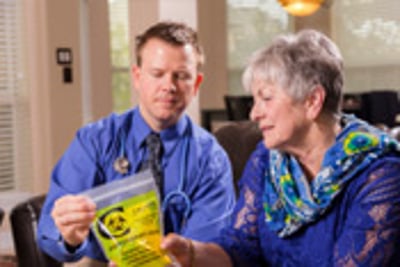FORCE's eXamining the Relevance of Articles for You (XRAY) program looks behind the headlines of cancer news to help you understand what the research means for you.
XRAY is a reliable source of hereditary cancer research-related news and information.
Learn more about the XRAY program
All XRAYs
Relevance: Medium


Strength of Science: Medium


Research Timeline: Human Research


Study : Potential genetic basis for breast cancer survivors who develop therapy-related leukemia
Relevance: Medium


Strength of Science: Medium


Research Timeline: Human Research


Most relevant for: Breast cancer patients who have an inherited mutation and breast cancer patients who developed leukemia after treatment for breast cancer.
The population of breast cancer survivors in the United States is increasing. One rare but dangerous long-term effect of breast cancer treatment is an increased risk of leukemia, a type of bone marrow cancer. A recent study uncovered a potential genetic basis for this condition. (01/26/2015)
Read More
Relevance: Medium-High


Strength of Science: Medium-High


Research Timeline: Post Approval


Study : Does lumpectomy or mastectomy provide better survival for women with early stage breast cancer?
Relevance: Medium-High


Strength of Science: Medium-High


Research Timeline: Post Approval


Most relevant for: Women with early stage breast cancer
Previous research has hinted that women who have breast-conserving surgeries have the same, if not better, overall survival as women who have mastectomies. Researchers in this study wanted to see if that was true; they found that women who chose breast-conserving surgeries did have a higher overall survival. However, this study, presented at the 2015 San Antonio Breast Cancer Symposium, had limitations that make it difficult to interpret the results or to extend them to all women with breast cancer. (01/19/2016)
Read More
Relevance: Medium


Strength of Science: Medium


Research Timeline: Lab Research


Study : Do parabens in personal care products increase breast cancer risk?
Relevance: Medium


Strength of Science: Medium


Research Timeline: Lab Research


Most relevant for: Women who use personal care products that contain parabens.
Parabens are chemicals that can mimic the hormone estrogen in the body. As estrogen has been shown to increase breast cancer risk, some people have asked if parabens found in some cosmetics and shampoos will also increase breast cancer risk. Many studies have shown that parabens in the quantities found in personal care products are safe. A recent study of human breast cancer cells suggests that in certain conditions, parabens could help some breast cancer cells grow. It is important to remember that this is early research; this single laboratory-based study does not conclusively prove that parabens are dangerous. More work, including human studies, needs to be done to understand if parabens increase cancer risk. (01/16/2016)
Read More
Relevance: Low


Strength of Science: Medium


Research Timeline: Animal Studies


Study : Study uses mice and brains from deceased Alzheimer’s patients to assess BRCA1 involvement
Relevance: Low


Strength of Science: Medium


Research Timeline: Animal Studies


Most relevant for: This research is not relevant to people
Researchers noted reduced levels of BRCA1 protein in the brains of mice and deceased Alzheimer's patients. While this study is interesting early work on the biology of Alzheimer's disease, the focus was primarily Alzheimer's disease, rather than the effect of BRCA1 mutations on Alzheimer's. Therefore, this study's observation may be something that is seen in Alzheimer's patients, but does not necessarily cause the disease. No studies suggest that BRCA1 mutation carriers are at increased risk for Alzheimer's disease. (12/22/2015)
Read More
Relevance: Medium


Strength of Science: Medium-High


Research Timeline: Human Research


Study : How many children with cancer have mutations in genes that increase cancer risk?
Relevance: Medium


Strength of Science: Medium-High


Research Timeline: Human Research


Most relevant for: Survivors of childhood cancer and people with a family history of relatives diagnosed with childhood cancers
Many genes are associated with increased cancer risk in adults, but it is unclear how common these mutations are in children with cancer. This study found that about 9% of children with cancer carry mutations in a gene that is known to increase cancer risk. Over half of the mutations were in the TP53 gene, which is associated with increased cancer risk at a young age and increased risk of breast cancer in adults. (12/15/2015)
Read More
Study : Effects of cancer diagnosis and treatment during pregnancy on the health and development of the child
Most relevant for: Women who were diagnosed with breast cancer while pregnant
Very little work has studied how a woman's cancer diagnosis and treatment during pregnancy affects her child. This study of women who were diagnosed with cancer while pregnant looks at their children at ages 18 months and 3 years. The study found no difference in general, cognitive, and cardiac development when compared to children born to healthy mothers. (12/08/2015)
Read More
Relevance: Low


Strength of Science: Medium


Research Timeline: Animal Studies


Study : Do antioxidants encourage the spread of cancer cells?
Relevance: Low


Strength of Science: Medium


Research Timeline: Animal Studies


Most relevant for: The clinical relevance of this study for people is not clear
Scientists do not yet know why some cancers spread to other parts of the body (a process called metastasis). A study in mice suggested that high doses of some antioxidants (chemicals that can protect cells from damage) might actually make it easier for cancer cells to spread. (12/01/2015)
Read More
Relevance: Medium


Strength of Science: Medium


Research Timeline: Human Research


Study : Aerobic exercise lowers estrogen levels in premenopausal women at high risk for breast cancer
Relevance: Medium


Strength of Science: Medium


Research Timeline: Human Research


Most relevant for: High risk women with a BRCA mutation or a close relative with a BRCA mutation
Many treatments that lower estrogen levels also reduce breast cancer risk. Unfortunately, these treatments are also associated with negative side effects. A recent study looked at the effect of regular aerobic exercise on the estrogen levels of women who are at high risk for breast cancer. (11/14/2015)
Read More
Relevance: Medium


Strength of Science: Medium-Low


Research Timeline: Human Research


Study : Breastfeeding may reduce hormone receptor negative breast cancer risk
Relevance: Medium


Strength of Science: Medium-Low


Research Timeline: Human Research


Most relevant for: Women who are pregnant or have just given birth and are deciding about breastfeeding
Previous studies have shown that women who breastfeed have a reduced breast cancer risk. This study examines this association in the different breast cancer subtypes (ER, PR, HER2 negative/positive) and finds that breastfeeding is associated with a reduced risk of ER-/PR- breast cancer. (11/16/2015)
Read More
Relevance: Low


Quality of Writing: Low


Article : What “The Truth About Cancer” got wrong about BRCA mutations and cancer
Relevance: Low


Quality of Writing: Low


Most relevant for: Because this video is full of medical misinformation, it is not relevant for anyone making healthcare decisions
A website called thetruthaboutcancer.com, created a 9-part docu-series titled “The Truth About Cancer: A Global Quest” (TACGQ). The video states that Angelina Jolie’s decision to remove her breasts was one made out of fear; one commentator states that her decision was “barbaric." This video contains a lot of dangerous misinformation about BRCA mutations and inherited cancer. FORCE XRAYS provides the following point-by-point analysis on "The Truth About Cancer." (11/10/2015)
Read More